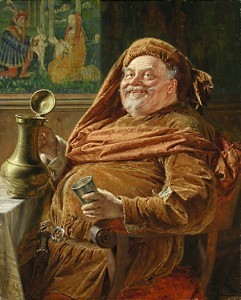Couldn’t Shakespeare Come Up With A “Catchier” title?

Falstaff, an amazing Shakespeare creation, dominates King Henry IV, First Part.
Shakespeare’s King Henry IV First Part is a great showcase for all things Falstaff. The play is the 17th in my effort to read the Bard by the Shakespeare 450th, and I really liked it–everything that is except the play’s name.
Perhaps Sir Jack is a strange character to start with when writing about the play, but his presence is huge (physically, of course, but morally as well). His slippery rejection of social rules overshadows the “acceptable” and “honor-based” struggle for power and dominion, death and war among royalty and elite.
This is not the pathetic, buffoonish, butt-of-the-joke Falstaff foisted on the characters of The Merry Wives of Windsor. This Falstaff is clever, witty, selfishly philosophical. He’s able to escape physical danger by effortlessly feigning death and able to twist less dangerous events to his advantage with his finely honed tongue—his weapon of choice.
His “wasp-tongue” spouts, along with the tongues of several other characters, an encyclopedia of insults. Insult exchanges between Falstaff and his friend Prince Henry remind me of the adolescent name-calling exchange in that classic baseball and Americana movie The Sandlot when the ball-playing heroes confront an arrogant opposing team. Maybe it’s even more indicative of contemporary internet “discussions” and politics that substitute name-calling for exchange of ideas and opinion. (For the fun of it, I’ve listed below some of the play’s insults. For the full Shakespeare insult treatment, you can also visit Ye Olde Official Shakespeare Insult Kit.)
Respect, Falstaff may not merit; but for the moral dilemmas and entertainment he presents, Falstaff captures our attention.
I have a harder time understanding and believing in his periodic companion in debauchery, Price Henry. It seems unlikely that this prince can join Falstaff in dissipation, then instantly rise heroic to save the kingdom. I know he explains it’s all part of his plan to make his royal rise all the more spectacular for the people. But I suspect that under most circumstances, dissipation only leads to further dissipation, and rarely to instant redemption and perfection.
But heroic, the prince does become in the righteous endeavor of saving his father. His father is the very Bolingbroke (now King Henry IV) who earlier usurped the kingdom of Richard II and had that king killed. It’s no wonder that he now fears and battles those who helped him in his ascent.
Words that came to mind as I read the play are rebellion and pride are folly.
King Henry IV First Part, on the backs of Prince Henry and Falstaff, earns five Bards:

Quotes I liked for various reasons:
Prince Henry: …Wisdom cries out in the streets, and no man regards it.
Prince Henry: …He will give the devil his due.
Prince Henry: If all the year were playing holidays, to sport would be as tedious as to work….
Hotspur: I will ease my heart, albeit I make a hazard of my head.
Northumberland: Why, what a wasp-tongue and impatient fool art thou…tying thine ear to no tongue but thing own!
1st Carrier: …It was the death of him.
Prince Henry: Ill-weav’d ambition, how much art thou shrunk! When that this body did contain a spirit, a kingdom for it was too small a bound; but now two paces of the vilest earth is room enough…
Falstaff: …A plague upon’t, when thieves cannot be true to one another.
Falstaff: The better part of valour is discretion… (Said by a character who epitomizes cowardice.)
Selected insults (there were more, believe it or not) from various characters. Don’t try these at home without adult supervision or explanation:
Ye fatguts
Lack-brain
Gorbellied knaves
Fat chuffs
Mad-headed ape
Woolsack
Round man
Clay-brained guts
Nott-pated fool
Obscene, greasy, tallow-keech
Sanguine coward
Bed-presser
This horse back-breaker
Huge hill of flesh
Starveling
Elf-skin
Dried neat’s tongue
You stockfish
Tailor’s yard
You sheath
You bow-case
You vile standing-tuck
Good pint-pot
Good tickle-brain
Trunk of humours
Bolting-hutch of beastliness
Swollen parcel of dropsies
Huge bombard of sack
Stuffed cloak-bag of guts
Reverend vice
Gray iniquity
Father ruffian
Vanity in years
Smiling pick thanks
Base newsmongers
Impudent, embossed rascal
Sneak-cup
Next Up (if you’re reading along): King Henry IV, Second Part–a surprise, I’m sure.
The post Couldn’t Shakespeare Come Up With A “Catchier” title? appeared first on Michael J. Roueche.




